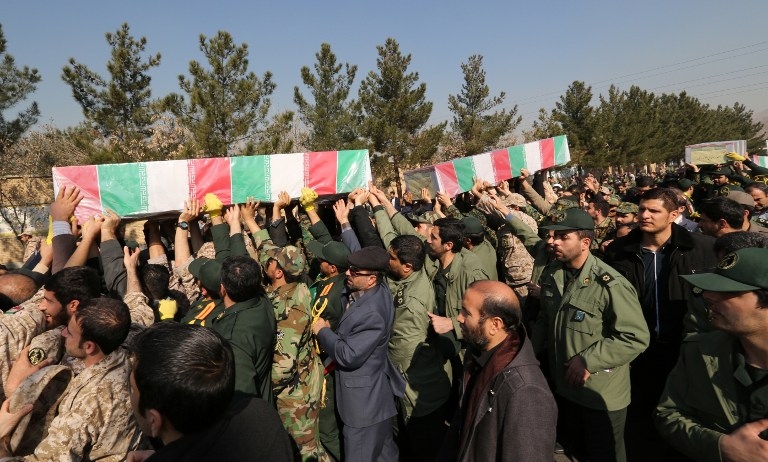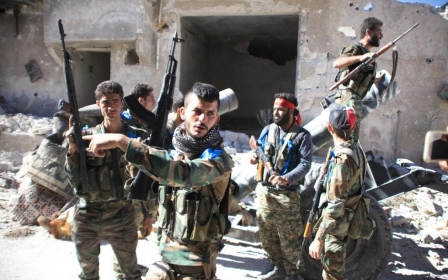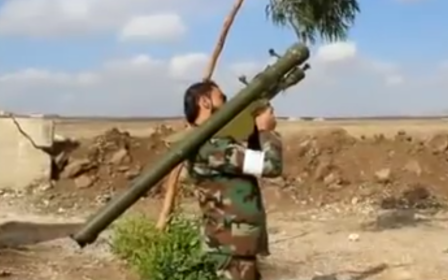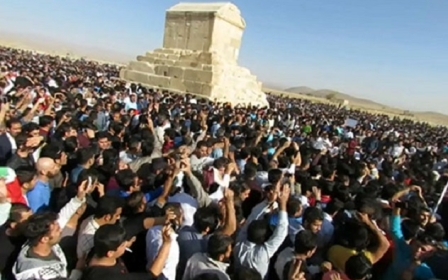Iran: More than 1,000 combatants killed in Syria, says official

More than 1,000 combatants sent from Iran to fight in support of President Bashar al-Assad in Syria have been killed during the conflict, the head of Iran's veterans' affairs office said on Tuesday.
"The number of martyrs from our country defending the shrines has now passed 1,000," Tasnim news agency quoted Mohammad Ali Shahidi Mahalati, the head of Iran's Foundation of Martyrs' and Veterans' Affairs, as saying.
Iran has sent military advisers, as well as volunteer fighters recruited from Afghanistan and Pakistan, to work with Assad's forces. They are known in Iran as "defenders of the shrines" in reference to Shiite holy sites in Syria.
Shahidi did not specify the nationalities of those killed. Shia Iran is a staunch supporter of Assad and provides both financial and military support for his government.
The Fatemiyoun Division of Afghan recruits organised by Iran comprises the majority of volunteers sent from Iran to fight in Syria and Iraq.
Iran says they are sent to fight against Sunni militants such as the Islamic State group (IS).
The Islamic republic denies having any boots on the ground in Syria, and insists its commanders and generals of the elite Revolutionary Guards' foreign operations wing act as "military advisers" both there and in Iraq.
But a high-ranking member of Iran's elite Revolutionary Guards Corps (IRGC) and six Iranian Basij militia volunteers were killed in fighting in Syria in February.
The semi-official news agency Tasnim reported at the time that IRGC Brigadier General Mohsen Ghajarian was killed in the northern Syrian province of Aleppo adding that he had been advising Assad's forces in fighting IS.
Death toll upsurge
Iranian media regularly report on the death in Syria of Iranian, Afghan and Pakistani "martyrs" whose bodies are buried in Iran. The latest death toll is significantly higher than previous tallies, although no overall figures have been officially announced so far.
In August, Shahidi said Iran's Foundation of Martyrs' and Veterans' Affairs was caring for 400 people related to fighters killed in action in Syria and Iraq, half of them Afghans.
"We immediately cover (the families) that the Quds Force announces to us," he said, according to ILNA news agency, referring to the Guards' foreign operations wing headed by Major General Qassem Suleimani.
"We are waiting for the Quds Force to confirm the martyrdom" of more fighters, "so we can cover their families too," he said at the time.
Iran in May passed a law allowing the government to grant citizenship to the families of foreigners killed while fighting for the Islamic republic. The law could apply to volunteers from Afghanistan and Pakistan who are fighting in Syria and Iraq against militants including those from IS.
Iran’s influence over Syria
Although analysts agree that Iran’s direct military presence in Syria remains fairly modest with Iran mostly relying on militias comprised of foreign nationals to fight in Syria, Iranian influence over the civil war has come under increasing scrutiny.
According to the Washington Post's Beirut correspondent Hugh Naylor, “Thousands of Shia militiamen from Lebanon, Iraq, Pakistan and Afghanistan who are loyal to Iran” have been sent to Syria to help support Assad in his endeavour to quash rebel fighters in Syria.
In a piece published by the Washington Post on Sunday, Naylor claimed that: “These religiously motivated fighters have reinforced Syria’s badly weakened military… [and are now] playing an increasingly critical role in trying to seize opposition-held eastern Aleppo by coordinating their attacks with government forces and warplanes flown by Russia.”
Analysts have suggested that the Iran's influence over Syria may even go beyond the outcomes of the war itself.
Philip Smyth, an expert on Shia militias at the Washington Institute for Near East Policy, suggests that the Iran-backed militias in Syria appear to be forming a ground coalition that “long after the war, will stay there and wield a strong military and ideological influence over Syria for Iran,” the Washington Post quoted Smyth as saying.
Iran has positioned itself as the defender of Shia minorities throughout the Middle East and has tried to expand its influence in the region by fighting proxy wars in Yemen and Syria.
The defeat of rebel fighters in Aleppo could further bolster Iran’s influence in the region, say analysts.
“A defeat of the rebels in Aleppo would be a turning point in which Assad captures most of the urban centers of Syria,” the Washington Post quoted Fawaz Gerges, professor of Middle Eastern politics at the London School of Economics as saying.
“It would be a setback for Saudi Arabia in its rivalry with Iran, which, as a result, would see its influence in Syria increase even more.”
New MEE newsletter: Jerusalem Dispatch
Sign up to get the latest insights and analysis on Israel-Palestine, alongside Turkey Unpacked and other MEE newsletters
Middle East Eye delivers independent and unrivalled coverage and analysis of the Middle East, North Africa and beyond. To learn more about republishing this content and the associated fees, please fill out this form. More about MEE can be found here.




